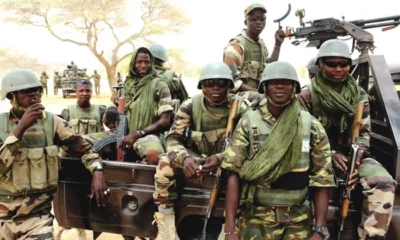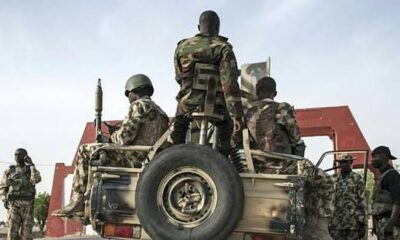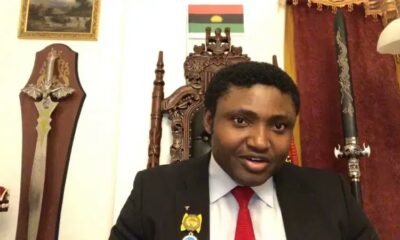Inside Nigeria
Terrorism: Over 10,000 has died in Nigerian military detention – Amnesty International

Amnesty International has raised serious allegations concerning the Nigerian military’s conduct during the Boko Haram insurgency in the North-East.
The organization claimed that over 10,000 people have died in military custody since the conflict began.
Isa Sanusi, Amnesty International’s Country Director, disclosed during a press conference on Thursday that the organization has taken the matter to the International Court of Justice (ICJ) in The Hague. The case accuses the Nigerian government and military of committing crimes against humanity in their handling of the insurgency.
The allegations highlight severe human rights violations, including the unlawful detention and mistreatment of thousands of individuals in military custody. Amnesty International has called for accountability and international oversight to ensure justice for the victims.
“The Nigerian military has frequently treated anyone from areas controlled by Boko Haram as suspected members of the group,” Sanusi stated.
He highlighted documented war crimes by government forces, including attacks on civilians, extrajudicial executions, torture, rape, and enforced disappearances.
Amnesty’s findings also suggest that members of the Nigerian military may have committed crimes against humanity, including murder, extermination, imprisonment, and gender-based persecution.
The organization’s 2015 report concluded that these actions were likely part of a policy to systematically target civilians.
The 144-page report presented at the conference also condemned Boko Haram for atrocities such as mass killings, abductions, and attacks on schools, aimed at deterring education, especially for children.
“Boko Haram has carried out widespread abductions, particularly of girls and young women, and has attacked schools to prevent what it deems ‘Western’ education,” the report stated.
Efforts to obtain comments from the Director of Defence Media Operations, Maj. Gen. Edward Buba, were unsuccessful, as calls and emails went unanswered at the time of filing this report.
The allegation by Amnesty comes days after the Federal Government, through the Attorney General of the Federation, Lateef Fagbemi (SAN), decried the prolonged investigation of the Nigerian military by the ICC, tagging it unjust.
The AGF stated the country’s position on Monday in a statement made available to the media in Abuja by the Special Adviser to the President on Communication and Publicity, Office of the AGF and Minister of Justice, Kamarudeen Ogundele.
According to the statement, the AGF, in his remarks at the 23rd session of the Assembly of States Parties to the Rome Statute of the ICC in Hague, stated that Nigeria at the global stage had demonstrated the will to promote justice and end terrorism among other global crimes.
The AGF, while expressing the country’s commitment to confronting impunity, holding perpetrators of heinous crimes accountable, and restoring justice for victims, noted further that the preliminary examination into alleged crimes in Nigeria had lasted 14 years and was demoralising to the service men laying their lives to defend their country against terrorists.
He said, “He said, “While we respect the court’s mandate to intervene when states are unable or unwilling to prosecute such crimes, it is important to emphasise that there must be respect and regard to the principle of complementarity. The ICC is meant to act as a court of last resort, intervening only when national legal systems are unable or unwilling to address grave crimes. I must assert that Nigeria does not fall under any such situation. Our nation has consistently demonstrated both the will and the capacity to investigate and prosecute serious crimes, including those committed by Boko Haram and other terrorist groups. We are proud of the Nigerian military, which has systems and structures in place to ensure their operations are guided by international humanitarian law and human rights principles.
“At the 22nd Session of this Assembly, Nigeria reported the establishment of an independent Special Investigative Panel by the National Human Rights Commission to address allegations against the Nigerian military made by Reuters. After thorough investigations spanning eight months, the panel found no evidence to substantiate these claims. The allegations of killings, torture, and the recruitment of underage fighters have been proven to be false and exaggerated.
“Nigeria stands firm with fellow State Parties in the shared commitment to ending impunity for the world’s most serious crimes. We fully support the work of the ICC and encourage those States Parties yet to accede to the Rome Statute to do so.”































